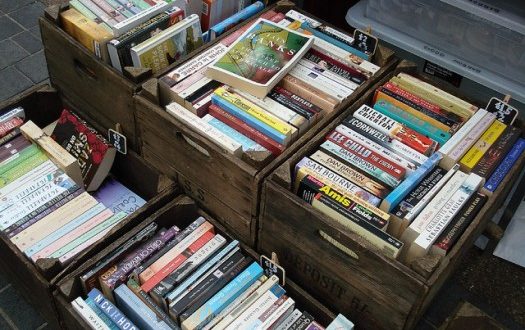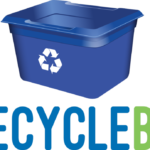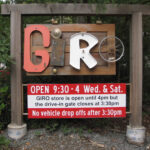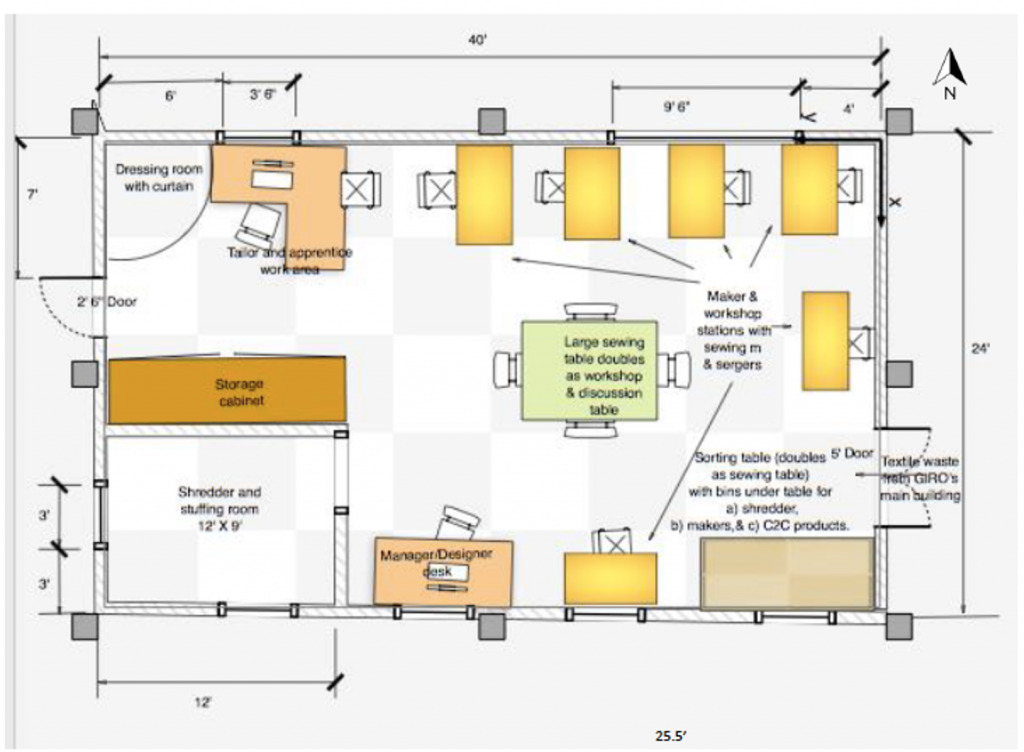The problem with books, mixed paper, and end markets
Since GIRO reopened its services in June we have been inundated with recyclable materials, specifically books. We receive a huge variety of books, the largest category consists of: textbooks, computer books, encyclopedias, manuals, magazines and mouldy books. These makeup approximately 70% of the books that we receive. Books fall into the “mixed paper” category, but before they can be included in our mixed paper mega bag and transported to Cascade Recovery at Duke Point, they need to have the spine removed. The spine contains formaldehyde which pulp and paper mills and other processors will not accept. Five years ago, as a solution to enable the paper from books to be recycled instead of landfilled due to the glue in the spine, GIRO invested in an industrial paper cutter. The paper cutter can remove the spine from five standard magazines, stacked together, in five seconds. It sounds relatively efficient, and it is for magazines, as the cutter can cut through the cover of a magazine with ease. If we are removing the spine from books however, then first we must tear off the hardcover by hand (as the paper cutter cannot cut through a hardcovered book), therefore adding to the labour involved. Currently, we have approximately thirty boxes of hardcovered books waiting to be processed at any one time. We have been receiving approximately ten boxes every depot day from islanders.
Another challenge right now regarding mixed paper is that for the last thirty years up to 90% of recyclable materials; (paper, cardboard, plastics, steel etc.) worldwide were sent to China. In 2018 China declared that they would no longer be accepting these materials as the contamination levels were too high. China was basically done with receiving the rest of the worlds low-grade contaminated recycling. This sent the recycling industry worldwide into a panic as they had to search for alternative end markets. For a while other developing countries (Vietnam, India, Thailand), accepted some of the excess, but in the last year these countries have also created more stringent regulations regarding contamination and moisture level content, which has further reduced the end market options for mixed paper.
What does this mean for GIRO?
Mixed paper as a material has very little fibre content. The fibre content is what is needed to turn mixed paper into other paper products. In contrast, office paper (photocopy paper), can be turned back into office paper up to five to seven times before more virgin wood-pulp is needed to increase the fibre content. Mixed paper also contains too many contaminants (dyes, fillers, clays, glues) to be able to turn it back into office paper, therefore it has to be downcycled into lower grade products (tissue paper, construction paper, Kleenex, cup-holders). As there is such a glut of mixed paper in the market globally right now, its value as a reusable commodity has plummeted. We currently pay Cascade Recovery between $150.00-$185.00 per metric tonne to take our mixed paper (two mega bags, 4 cubic feet each equal one tonne). Islanders are currently dropping off enough books and mixed paper to fill two mega bags a week.
What can you do to help?
Consider the following facts:
- In the last four decades the use of photocopy paper has risen by 400%.
- Lessening of paper usage was predicted due to the electronic revolution, it did not happen. Demand for paper is expected to double by 2030.
- Around 35% of all trees cut down are used to make paper
- Deforestation has become a major issue in developed and developing countries.
- A significant amount of paper does not get recycled. Paper products make up 28% of the solid waste in landfills in Canada.
- Paper releases methane as it breaks-down anaerobically in a landfill. Methane is a highly potent greenhouse gas contributing to climate change.
- Pulp and paper mills contribute to air, water, and land pollution, generating the third largest CO2 emissions in Canada.
- Recycling paper preserves trees and forests. Every ton of recycled paper saves about 17 trees.
- Recycling paper reduces the demand for cutting down trees
- Recycling paper requires 40% less energy than making it from scratch
- It takes approximately 5 litres of water to produce 1 sheet of A4 office paper from virgin wood pulp
- 50% of the waste from businesses is composed of paper
Due to the current costs for GIRO to process mixed paper, I could simply advise islanders to place all paper products curbside and let the RDN deal with the processing costs. However, I believe we need to look at more sustainable solutions. Rethinking and Reducing are good places to start. Yes, it is important to recycle your paper products, but even more important to reduce your use of them in the first place. Focus on the following points:
- Go paperless for all your bills
- Notify the post office that you do not wish to receive any junk mail
- Separate your office paper from your mixed paper prior to dropping off at GIRO. The office paper has value and will be processed separately.
- Review all documents carefully before printing. On average people print a document four times due to errors.
- Print double-sided
- Reuse any scrap paper for notes
- Read your daily news online rather than buying a newspaper
- Teach your children about this valuable resource and how to minimize waste
Regarding the back log of books right now at GIRO, if I could ask islanders to hold off on their book donations to allow us to get caught up, that would be a huge help. There will be a short announcement in the Sounder and on the website when we are able to accept them again.
For more information on rethinking and reducing strategies visit GIRO on Wednesday and Saturdays to speak to the Recycling team.
Thank you for your continued support,
Michelle MacEwen
General Manager







